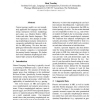9 search results - page 1 / 2 » Integrated Morphological and Syntactic Disambiguation for Mo... |
ACL
2006
13 years 6 months ago
2006
Current parsing models are not immediately applicable for languages that exhibit strong interaction between morphology and syntax, e.g., Modern Hebrew (MH), Arabic and other Semit...
LREC
2008
13 years 6 months ago
2008
Morphologically rich languages pose a challenge to the annotators of treebanks with respect to the status of orthographic (spacedelimited) words in the syntactic parse trees. In s...
TSD
2007
Springer
13 years 10 months ago
2007
Springer
Many state-of-the-art statistical parsers for English can be viewed as Probabilistic Context-Free Grammars (PCFGs) acquired from treebanks consisting of phrase-structure trees enri...
ACL
2008
13 years 6 months ago
2008
Morphologicalprocesses in Semitic languages deliver space-delimited words which introduce multiple, distinct, syntactic units into the structure of the input sentence. These words...
EMNLP
2007
13 years 6 months ago
2007
In morphologically rich languages, should morphological and syntactic disambiguation be treated sequentially or as a single problem? We describe several efficient, probabilistica...

